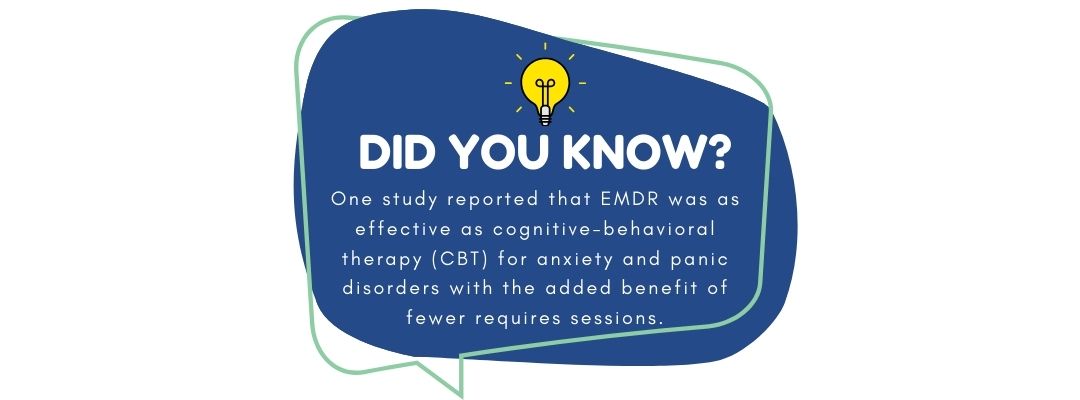Does EMDR Help with Anxiety? Understanding Its Effectiveness and Benefits
Does EMDR help with Anxiety? Many people suffer from anxiety, and finding effective treatments can be challenging. EMDR, or Eye Movement Desensitization and Reprocessing, has emerged as a promising option for those seeking relief. Research shows that EMDR can significantly reduce anxiety symptoms by addressing the root causes and changing how the brain processes distressing memories.
Through the use of guided eye movements, EMDR helps individuals reprocess traumatic experiences and the anxiety associated with them. This therapy is not only suitable for post-traumatic stress disorder but also for various anxiety disorders, including phobias and panic attacks. As more studies highlight its effectiveness, many are turning to EMDR as a viable alternative to traditional therapies.
As with any treatment, outcomes may vary from person to person. However, for those struggling with anxiety, understanding how EMDR works and its potential benefits can be a key step toward finding relief.
Key Takeaways
- EMDR therapy effectively targets the root causes of anxiety.
- This treatment is beneficial for various anxiety disorders.
- Individual responses to EMDR may vary, making personalized therapy important.
Understanding EMDR Therapy
EMDR therapy is a well-established treatment that focuses on the processing of distressing memories. It helps individuals manage anxiety by transforming the way they experience past events and feelings.
Basics of EMDR
Eye Movement Desensitization and Reprocessing (EMDR) is a psychotherapy method developed to treat trauma and anxiety. It utilizes the brain’s natural ability to process information. EMDR connects distressing memories with adaptive beliefs to reduce emotional intensity.
The therapy consists of eight phases, starting with history taking and establishing a treatment plan. This process involves identifying negative beliefs and distressing memories. Patients learn coping techniques to manage emotional responses effectively. Research shows that EMDR can be beneficial for various anxiety disorders, making it a versatile option for treatment.
The EMDR Process
The EMDR process follows a structured approach. It begins with assessing the client’s history and developing a treatment plan. After that, the therapist helps identify specific memories linked to anxiety.
During the therapy, clients focus on these memories while engaging in bilateral stimulation, typically through guided eye movements. This dual attention helps desensitize the emotional charge associated with the memories.
The phases also include installing positive beliefs. Clients will confront and process their anxiety’s triggers in a safe environment. Over time, individuals often notice a decrease in anxiety symptoms, leading to improved coping mechanisms. This structured approach makes EMDR an effective therapy for many struggling with anxiety.
EMDR Therapy for Anxiety: Does EMDR Help with Anxiety?
EMDR therapy is a structured approach that can effectively address anxiety by processing distressing memories and emotions. This therapy is gaining attention for its unique methods and beneficial outcomes.
Effectiveness of EMDR
EMDR therapy has been shown to significantly reduce anxiety symptoms. Research indicates it can alter the emotional intensity of troubling memories. It helps individuals connect current anxiety symptoms with past experiences or negative beliefs.
A study highlighted in the article on EMDR for anxiety stated that this therapy can treat various anxiety forms, such as phobias, OCD, and panic attacks. Many practitioners use EMDR in combination with other therapies, enhancing its effectiveness.
This approach consists of eight phases, where clients reprocess distressing experiences, leading to lasting relief. Many individuals report feeling less anxious and more in control after treatment.
EMDR for Specific Anxiety Disorders
EMDR therapy can be tailored to address different anxiety disorders. For instance, individuals suffering from social anxiety benefit from reprocessing experiences tied to fear of judgment.
In cases of panic disorder, EMDR focuses on past panic attacks, helping clients manage their fear response. The therapy also addresses specific triggers.
According to the EMDR International Association, treating phobias with EMDR allows clients to confront fears without avoidance. Clients often find that their anxiety decreases more quickly than through traditional methods.
Individuals with generalized anxiety disorder may also experience reduced worry and tension. Overall, EMDR provides a structured method to tackle different anxiety forms effectively.
Source: EMDR International Association
Comparing EMDR to Other Treatments
When exploring the effectiveness or does EMDR help with anxiety, it is essential to compare it with other treatment methods. Two common approaches are Cognitive Behavioral Therapy (CBT) and medication. Each has unique benefits and limitations that can help individuals make informed decisions about their care.
Cognitive Behavioral Therapy (CBT) Versus EMDR
Cognitive Behavioral Therapy is a well-known treatment for anxiety. It focuses on changing negative thought patterns and behaviors. CBT often requires several sessions and active participation from patients to learn coping strategies.
In comparison, EMDR offers a different approach by processing distressing memories. Studies show that EMDR can produce quicker results for some individuals with anxiety, especially those with a history of trauma. This therapy uses bilateral stimulation, like eye movements, to help clients reprocess memories.
While CBT is effective for various anxiety disorders, EMDR is particularly beneficial for post-traumatic stress disorder (PTSD). Each method has its strengths, and the choice may depend on personal preferences and past experiences.
Medication Versus EMDR
Medication is frequently prescribed for anxiety disorders. Common types include antidepressants and anti-anxiety medications. These drugs can be effective in managing symptoms but may come with side effects.
EMDR, on the other hand, does not rely on medication and instead houses the potential for lasting change through memory processing. Research indicates that EMDR can lead to improvements in anxiety symptoms without the risk of side effects associated with medication.
Individuals may prefer EMDR to avoid long-term medication use. Knowing the differences ensures people choose a treatment that aligns with their needs and health goals.
Patient Considerations and Outcomes
EMDR therapy can be beneficial for many individuals dealing with anxiety. Understanding who can gain from this treatment and what to expect during the sessions helps set realistic expectations.
Who Can Benefit from EMDR?
EMDR can assist a variety of individuals facing anxiety disorders. It is particularly effective for those who have experienced traumatic events. This includes people with post-traumatic stress disorder (PTSD), panic attacks, and various phobias.
Individuals dealing with social anxiety and specific performance-related fears may also find relief through EMDR. Moreover, it can help those who have tried other therapies without success.
It’s important for potential patients to discuss their unique situations with a qualified therapist. A professional can evaluate the right fit for EMDR based on their history and symptoms.
What to Expect from EMDR Sessions
During EMDR sessions, patients can expect a structured approach. The therapist will guide them through eight phases of treatment.
Initial phases focus on building a therapeutic relationship and understanding the patient’s history. Following this, the therapist aids the patient in identifying distressing memories.
In later phases, the therapist uses bilateral stimulation, helping to facilitate processing of painful memories. Sessions vary in length but typically last about 60 to 90 minutes.
Patients may feel emotional during sessions, which is a normal part of the process. Many report feeling a sense of relief as they work through their anxiety. Progress can vary, with some individuals experiencing noticeable changes after several sessions.
Frequently Asked Questions
This section addresses common inquiries regarding EMDR therapy and its effectiveness for anxiety. It covers how the therapy works, its potential risks, and the typical duration of treatment, among other important aspects.
How does EMDR therapy support individuals with anxiety?
EMDR therapy helps individuals by addressing distressing memories and emotions linked to their anxiety. The process guides clients through targeted eye movements to reprocess these memories, reducing their emotional impact. By doing so, clients often experience a decrease in anxiety symptoms.
What have reviews indicated about the efficacy of EMDR for anxiety management?
Reviews of EMDR therapy suggest it can be effective for anxiety management. Research shows that many individuals report significant reductions in anxiety levels after undergoing EMDR. Clinical studies support its role as a beneficial treatment alongside other therapeutic methods.
Can EMDR therapy be harmful, and are there any associated risks?
While EMDR therapy is generally safe, some individuals may experience temporary increases in anxiety during sessions. It is crucial for patients to work with a trained professional. Open communication with the therapist can help mitigate potential discomfort or any feelings of being overwhelmed.
What mechanisms are involved in EMDR’s approach to treating anxiety?
EMDR utilizes a unique eight-phase approach to therapy. This method helps patients connect their current anxiety symptoms to past experiences or negative beliefs. By reprocessing these connections, patients can change their emotional responses related to anxiety.
What is the typical duration of EMDR therapy for addressing symptoms of anxiety?
The duration of EMDR therapy can vary significantly based on individual needs. Generally, clients may engage in sessions for several weeks to a few months. The therapist will tailor the frequency and length of sessions to match the specific challenges faced by each client.
Is EMDR therapy considered an effective treatment for both anxiety and depression?
Yes, EMDR therapy is recognized as an effective treatment for both anxiety and depression. Many clients find it helpful for alleviating symptoms of both conditions simultaneously. The therapy’s focus on emotional processing allows for significant relief from distressing thoughts and feelings.
Conclusion
Does EMDR help with anxiety? EMDR therapy offers a unique and effective approach to managing anxiety by addressing the root causes of distress. Unlike traditional therapies, EMDR focuses on reprocessing distressing memories through guided eye movements, providing lasting relief for many individuals. With its structured eight-phase process, EMDR is a versatile treatment option for various anxiety disorders, including PTSD, phobias, and panic attacks.
While outcomes can vary, the growing body of research supports EMDR’s potential to transform how individuals experience and manage anxiety. For those seeking alternatives to traditional methods, such as medication or Cognitive Behavioral Therapy, EMDR presents a promising path toward emotional healing and resilience. Exploring this therapy with a trained professional can be a crucial step in finding meaningful relief and regaining control over one’s life.
You’re not alone, and help is always within reach. Contact us today at (774) 619-7750 and take control over your mental health.





